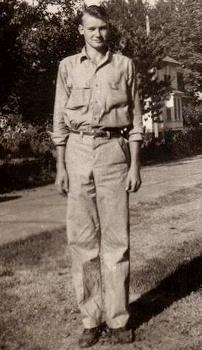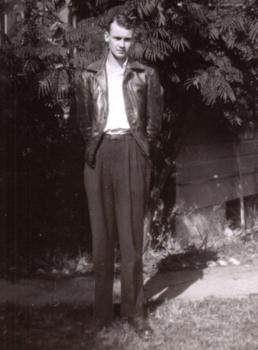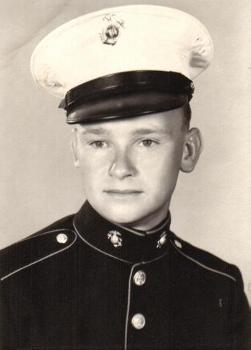Back to Main
Fay Albert Putman (May 16, 1926 - June 03, 2006)
Fay Putman was the son of Albert Putman and
Lela Ann Hileman. He married Norma Jean and had one son: Jim Putman. Fay passed
away Saturday, June 3rd, 2006. His funeral was held at Ozark Funeral Home in
Noel, Mo and he was buried in the Noel cemetary.
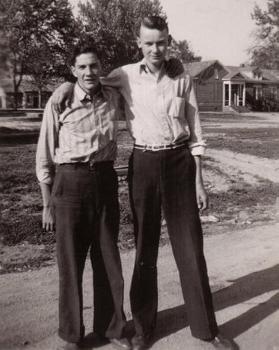 ca. 1951 Jack Hickman and Fay Putman Photo courtesy of Carol Putman |
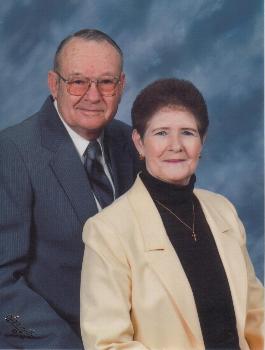 Fay and Norma Jean Putman 50th Wedding Anniversary (2000) Photo courtesy of Jim and Chris Putman |
FAY PUTMAN'S STORY
Interview with Fay Putman conducted October 24, 2003, by Marie Putman
Fay's father was Albert, son of Joseph Martin. His great grandfather was William Lester, the son of Jahu Putman.
The land where Fay was born north of Pea Ridge had been in Albert's family, and was given to him by his mother, Teresa, since he was the elder son, brother of W. T. During the depression Albert borrowed money on the house and went into the sheep business. He made a trip to Canada and bought a carload of sheep. On the way home he slept in the box car on the train with the animals. Albert eventually lost the farm and moved the family into town in the fall of 1938 when Fay was 12.
They spent the winter in the canning factory, which Albert had boarded up, also making a kitchen. This canning factory became their family business. In the spring Rex helped build a house. They went east to get lumber and sealed the sides with pine flooring because it was cheaper. There were three bedrooms on the west side with a porch on the back. His mother Lela only asked for French doors in the front. One time Jerry came home and found the house locked, so he busted one of the windows in the French doors to get in.
Going through boot camp in San Diego, the young lad decided he wanted to be a tail gunner. But there was no room, so he was sent to sea-going school and was given duty on a ship, the USS Independence. They went right by Wake Island which the Japanese had taken over. All ships would fire their guns at the island as they went by. Fay said, "It was fun."
|
The men were "eaten up" with bugs, so after returning aboard their original ship they were all stripped and sprayed with DDT.
|
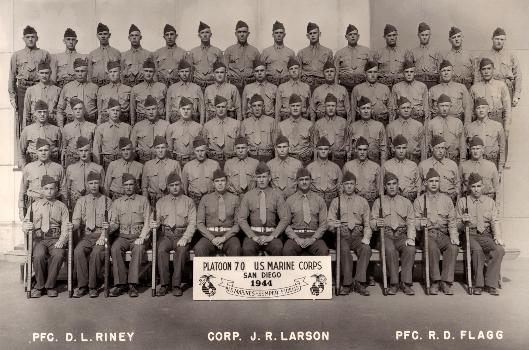
Platoon 70 U.s. Marine Corps, San Diego 1944 Fay Putman: back row 3rd from right Photo courtesy of Carol Putman |
Since everyone had enlisted only for the duration of national emergency, after the war they sailed to Portland, Oregon. It was the first time a war ship had landed in Portland and the people went crazy. There were soldiers and sailors all over. Fay returned home with a Jap rifle. They went to Marine barracks in Bremerton, Washington, where Fay was discharged and received pay to travel home to Arkansas. On the way Fay stopped in Lodi, California, to visit many of his friends from Pea Ridge who had ended up there.
Fay was only 19-years-old when he got home. His parents had moved to Gravette, so Fay moved in with Rex and went back to school in Pea Ridge, with other military guys. The superintendent tore up old manuscripts which showed their low grades, saying proudly, "You guys have been overseas." Even though he had two grades to complete, Fay only went one year before receiving his high school diploma.
Fay found he came out better drawing unemployment from the military than working for 50 cents an hour. So he helped his grandfather raise chickens in the old army barracks at Fort Crowder.
September of 1950 Fay reenlisted in the marines. He'd married Norma Jean Young three months earlier. She stayed with her grandparents until Fay got out of the military in 1953. Going in as PFC, Fay soon became Corporal. He was told, "You old guys won't have to go overseas again." Anyone over 20 was considered old. But they sent him to Korea. Again he was told he wouldn't be sent to the front. But they had so many losses, he was sent for intensive training.
He won his first purple heart in the front lines in Korea. That time he wasn't hospitalized.
Winning his second purple heart was different. Fay was fighting against China's first army they'd sent in the war. "Everyone was scared stiff. The Chinese had people in their army that all they'd do is throw hand grenades. They saw me in the little draw. I don't know how many grenades they threw at me. One blew the front hand guard off my rifle. (It was jammed.) Another grenade landed by my foot. I thought it had blown my foot off. I saw this one Chinese soldier who just stood there and looked at me. Maybe he thought I was dead, because he went on with the rest of his army. I finally got enough nerve to reach back and found my shoe was full of blood, but my foot was still there. I couldn't walk on it.
"A lieutenant was hollering "Putman, bring your men up." I had four men with me. The rifleman had been wounded earlier. So I crawled back to where the wounded were, probably a quarter of a mile.
"A little Porto Rican carried me on his back behind the lines where emergency medical men worked on us. They'd used up all the deadening medicine, so all they had left to give me was novocaine. Three guys laid across me to hold me down as they cut down into my foot to get out the shrapnel. We were out on a field, not even in a tent. They gave me the metal they cut out of my foot. Then after surgery I laid there an hour or two before they took me by field ambulance to a hospital ship bound for Tokyo, Japan." It was at this hospital where a Navy Captain gave him a second purple heart.
Spending only ten days in the hospital, Fay was put on a plane. It stopped in Hawaii and brothers Bill and Bob, who were in the Navy, came over to see him. "Everyone couldn't believe I had two brothers living in Hawaii. It was so unusual." There were so many wounded when the plane took off from the Hawaiian airport, they had trouble getting off the ground. Fay thought they had crashed. He reported they had the prettiest nurses on board. The plane landed in San Francisco and Fay chose to go to the hospital in Oakland. "I was able to get up and walk around." Joe and his wife Jessie had just bought a home in Concord so Fay went to see them.
In January of 1954 Fay became a guard at the Federal prison at Camp Crowder. He carried a shot gun along the towers, guarding American military soldiers "who went bad." Late one evening four or five prisoners went over the fence. Sirens went on and the guards began firing shots. Prisoners scattered, and they were all picked up, except for one. After searching with the army, they found he'd been hit in the back of his head. Bloody, he had laid outside all day, then hitch hiked to Springfield where he was picked up and taken to the hospital. He lived, but the guards were charged with assault to kill. Fay said, "I wished I'd never fired." The court found them not guilty.
Fay worked briefly at Fort Crowder in the officer's mess hall. His next job was as a guard at a man- made cave (mined out lime and made cave out of it) where supplies were stored underground in case of war. "The temperature stayed the same all year," Fay said. "I really liked that job, really interesting." North of Neosho, the cave is now home to Daisy BB Manufacturing Company. When it looked like the civil defense cave would be closed down Fay transferred to the Department of Agriculture and was a meat inspector at all kinds of meat plants around Noel. He retired from the Civil Service in 1981.
Fay and Norma are the parents of one child, James Albert. "Jim" and his wife, Chris, went back to college and got their Master's degrees when they were in their 40's, and both are professors. Fay lived in Noel, Missouri, for nearly 50 years. He served on the Noel City Council. His hobbies included gardening, coin collecting and caring for humming birds. Many summer he filled four pint-size feeders twice daily for the 100 plus birds.
On a wall in a new home he had built a few years ago, is a glass display case with all his metals. There are 16 combat metals from five major battles he fought in WWII and two major campaigns in Korea. And of course it includes his two purple hearts.
 Fay and Jerry Putman (ca.1949) |
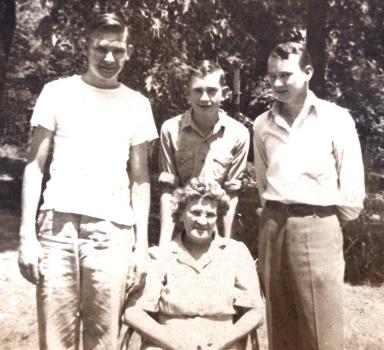 Lela Putman and three sons: Vance, Jerry and Fay (ca.1949) |

Danny, Jim, Butch and Billy (ca. 1970)
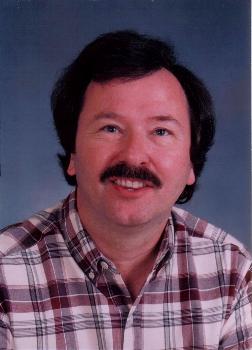
Jim Putman 2000
Photo courtesy of Jim and Chris Putman
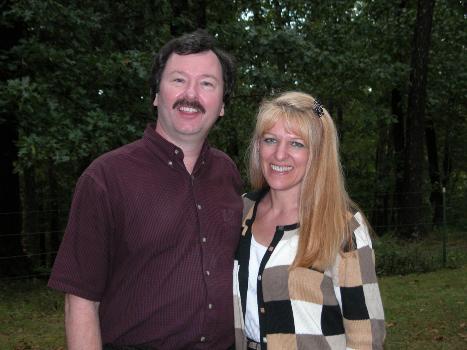
Jim and Chris Putman Oct 4, 2003
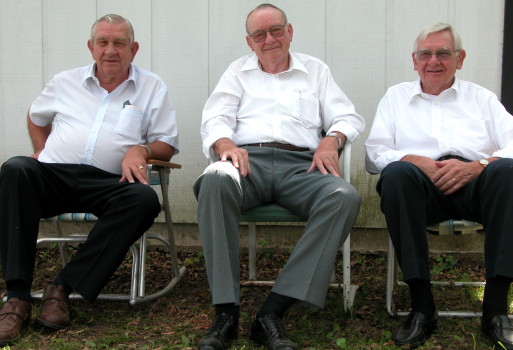
Jerry Putman, Fay Putman and
Vance Putman after
Rex Putman's funeral
Sep 01, 2004
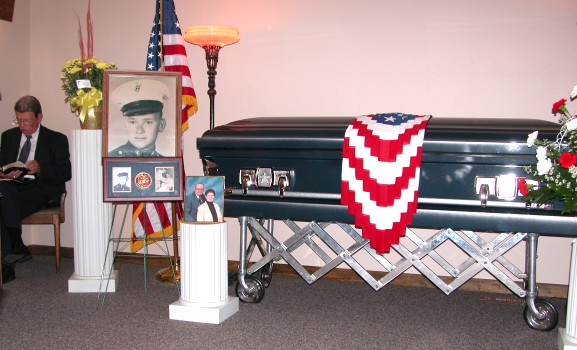
Fay Putman's Funeral Jun 7, 2006
at Ozark Funeral Home in Noel, Mo.
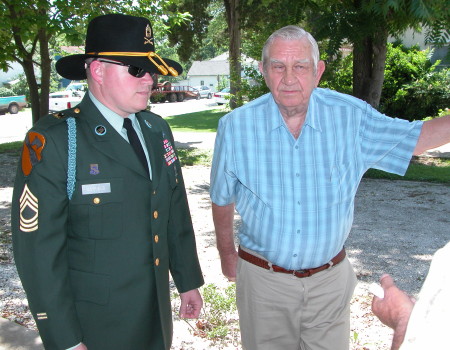
Fay Putman's Funeral Jun 7, 2006
Greg Mayfield and Jerry Putman
talk outside the funeral home.
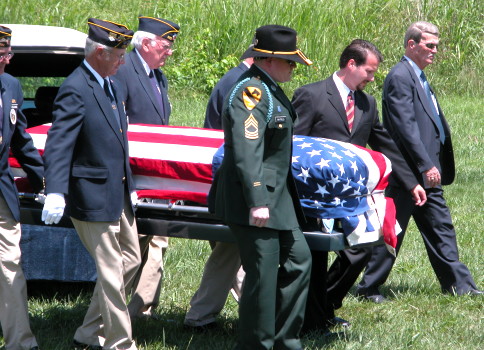
Fay Putman's Funeral Jun 7, 2006
Greg Mayfield assists the American Legion of Pineville as pall bearers.
Dr. Thomas Murphy walks in front of the coffin
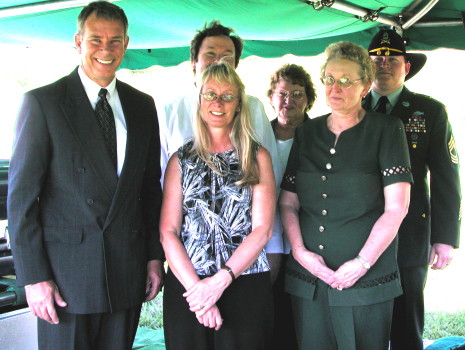
Fay Putman's Funeral Jun 7, 2006
Back row: Jim Putman, Joyce McCann, Greg Mayfield
Front row: Billy Putman, Teresa Hufford and Betty Knox
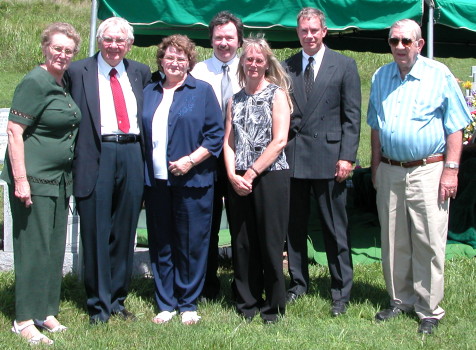
Fay Putman's Funeral Jun 7, 2006
Betty Knox, Billy Vance Putman
Joyce McCann, Jim Putman,
Teresa Hufford, Billy Putman and
Jerry Putman
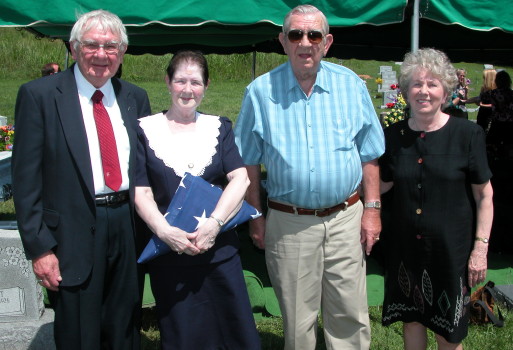
Fay Putman's Funeral Jun 7, 2006
Billy Vance Putman
Norma Jean Putman,
Jerry Putman and Marie Putman
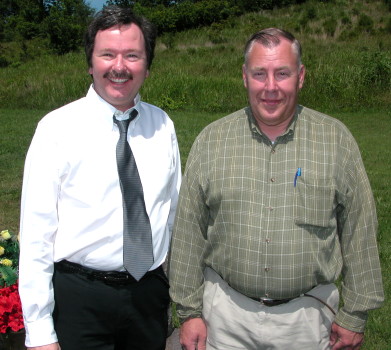
Fay Putman's Funeral Jun 7, 2006
Jim Putman and High School friend
